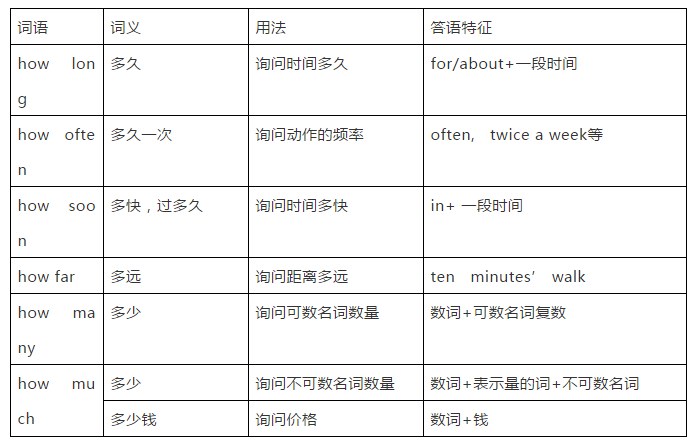maybe什么意思(maybe超哥什么梗)
(3)在as though(好像,仿佛),even though(即使,纵然)等固定短语中不能用although。例如:
The doctors have saved the dying man.
他有时这样做,有时那样做。
Exercise makes me keep healthy. 运动使我保持健康。
你或许是对的。
however和 but都意为“可是,但是”;但是用法不同。
我爷爷两年前去世了。
(1)be good to“对……好”,其反义短语为be bad to“对……不好”。介词to之后一般接表示人的名词或代词。例如:
Although he lives alone, he doesn’t feel lonely.= He lives alone, but he doesn’t feel lonely.
19. put off 推迟;延迟
least [li?st] adj.最小的;最少的
health [helθ] n.健康;人的身体或精神状态
他或许在办公室。
-How often do you exercise? 你多久锻炼一次?
Car accidents have caused a lot of deaths.
他夸夸其谈,好像无所不知。
车祸造成很多人死亡。
她擅长英语和汉语。
这个农场种植各种各样的庄稼,例如,稻谷、小麦和棉花。
7. at the age of 在......岁时
清洁日离现在仅仅两周的时间。
工作很辛苦,可是我很喜欢。
less than不到;少于
5. Exercise such as playing sports is fun…
现在的大部分人只是为找一份能挣许多钱的好工作而着急。
1. maybe
It’s very kind of you to help us. 你能帮助我们真是太好了。
(3)often 的频度为50%左右,意为“常常”,但不如usually那么频繁,表示动作重复,中间有间断。例如:
how often意为“多久一次”,常用于对时间频率的提问。例如:
housework [&39;ha?sw??k] n.家务劳动
writer [&39;ra?t?(r)] n.作者;作家
27. disabled people 残疾人
在你的帮助下,我才有可能拥有“幸运儿”。
18. call up 打电话;召集
You may be right. = Maybe you are right.
at least至少
28. make a difference 影响;有作用
我父母上班从来不迟到。
21. raise money 筹钱;募捐
2. But do you want to come?
虽然他一个人住,但他并不感到孤独。
23. give away 赠送;捐赠
There is air all around us, although we cannot see it.
swing [sw??] n.摇摆;秋千v.摇摆;旋转
Unit2 词汇精讲
We do morning exercises every day. 我们每天做早操。
Do you want to join us? 你想加入到我们中吗?
(3)however比but用的场合更正式, 因此however用于书面语,而but 常用于口语。另外, however的意思还不只局限于“但是;然而”,它还有其他的用法。例如:
7. Most people today are only worried about getting good jobs to make lots of money.
(2)作不可数名词,意为“锻炼、运动”,常与动词take连用。例如:
3. help out with sth. 帮助解决困难
How often do your parents visit your grandparents?
I wash my face twice a day. 我每天洗两次脸。
【拓展】die有多个变形词:
online [??n&39;la?n] adj.在线的adv.在线地
14. try out 试用;试行
她可能今天下午来。
5. care for 关心;照顾
(2)hard作形容词时,意为“困难的;硬的;勤奋的;严厉的;苛刻的”。hard作副词时常用来表示程度,意为“努力地;猛烈地;剧烈地”。例如:
result [r?&39;z?lt] .结果;后果
(2)usually 的频度为70%左右,意为“通常”、“平常”,即很少有例外。例如:
12. make a plan 制订计划
【拓展】although与though的辨析:
7. health
dentist [&39;dent?st] n.牙科医生
1
Unit2句式精讲
(4)sometimes 的频度为20%左右,意为“有时”,表示动作偶尔发生。可以位于句首,以示强调。例如:
although的意思相当于though,意为“尽管,虽然”,用来引导让步状语从句。它所引导的从句不能与并列连词but; and; so等连用,但可以和yet; still等词连用。例如:
5.You can see in their eyes that they&39;re going on a different journey with each new book.
没有汽车你究竟是怎样来的呢?
2. although
rain—rainy 雨—下雨的 sun—sunny 太阳—晴朗的
垃圾食品对我们的健康没有好处。
How often do you watch TV?
I can’t find my watch. It may be in your pocket.
8. You helped to make it possible for me to have Luck.
29. be able to 能够

你的父母多久看一次你的祖父母?
although [??l&39;e??] conj.虽然;尽管;然而;可是
American Teenager 《美国青少年》
对我们来说,学习一门外语是相当重要的。
无论我多么努力地工作,她从来没满意过。
There is hardly any coffee left.= There’s almost no coffee left. 几乎没有剩余的咖啡了。
大概你把信放在衣袋里了。
Claire 克莱尔
such as例如;诸如
你多久看一次电视?
8.clean up 打扫(或清除)干净
She wants a cup of tea. 她想要一杯茶。
more than超过;多于;不仅仅;非常
(6)never 的频度为0,意为“从来不”、“永不”。例如:
1. The boy could give out food at the food bank.
(2)but是并列连词,连接两个并列分句,后面不用逗号,前后两句在总的意义上构成了对比。例如:
program [&39;pr??ɡr?m] n.节目;程序;课程;节目单
die [da?] v.死;枯竭;消失
maybe是副词,而在may be中,may是情态动词,be是动词原形,两者构成完整的谓语形式,与主语形成系表结构,意为“也许是、可能是”。例如:
(2)maybe和may be可相互转换。例如:
老师已为大家备好电子打印版,想要获取电子打印版请私信:学习资料。
(1)作不及物动词,意为“锻炼、运动”。例如:
Plants and people will die without water.
从他们的眼睛里你可以看到他们正在进行每本不同的新书之旅。
It’s important for us to learn a foreign language.
4
20. for example 比如;例如
He usually goes to bed at ten o’clock. 他通常10点钟睡觉。
hardly和hard形式上很接近,但意义截然不同。
我实在是不喜欢吃奶酪,但是这次我要尝一点。
8. once / twice
twice [twa?s] adv.两倍;两次
percent [p?&39;sent] adj.百分之...的
例如:The tree has been dead for ten years. 这棵树死了10年了。
(2)although一般不用作副词,而though可用作副词,且一般放在句末(不放在句首),意为“可是,不过”。例如:
magazine [&39;m?ɡ?zi?n] n.杂志
They tried hard to succeed. 他们努力工作,以求得成功。
我想游泳。
6. the look of joy 快乐的表情
He wants me to help him. 他想要我帮他。
Junk food is not good for our health.
雨下得很大,然而我们还是出去寻找那个孩子。
4. It is good to relax by using the Internet or watching game shows…
我们做英语练习以便学好英语。
2. an old people’s home 养老院
5. hardly&hard
once“一次”,twice“两次”,在英语中三次或三次以上通常用“基数词+times”表示,time在这里为可数名词,意为“次数”,复数加s。例如:
(1)maybe和may be的辨析:
对我们来说,多吃蔬菜和水果是必要的。
He may be a soldier. 他可能是军人。
1.Clean-Up Day 清洁日
She is very good to us. 她对我们很好。
junk food n.垃圾食品;无营养食品
(1)want意为“想要”后可接名词或不定式,构成want to do sth. 意为“想要做某事”;want sb. to do sth. 意为“想要某人做某事”。例如:

6. I want to put off my plan to work in an animal hospital until next summer.
Maybe you put the letter in your pockets.
Are you good with children?你和孩子们相处得好吗?
1. How often do you have piano lessons?
hardly [&39;hɑ?dli] adv.几乎不;简直不;刚刚
(3)be good with“和……相处得好;擅于和……相处”。例如:
She is good at English and Chinese. = She does well in English and Chinese.
want后接动词不定式时,相当于would like;因此want (sb.) to do sth.=would like (sb.) to do sth. 例如:
4. used to 过去常常......
The boss is bad to his workers.那个老板对他的工人不好。
health为名词,意为“健康”,其形容形式为healthy,意为“健康的”。unhealthy意为“不健康的,是healthy的反义词。healthily是“健康地”,是副词。
maybe是副词,意思是“也许,可能”,在句中作状语,相当于perhaps,常位于句首。例如:
2
(5)hardly ever 的频度为5%左右,意为“几乎不”、“偶尔”。例如:
ever [&39;ev?(r)] adv.曾经;在任何时候
We all tried our best. We lost the game, though.
我们都尽了最大努力,但我们还是输了。
together [t?&39;ɡee?(r)] adv.共同;一起
He is often late for school. 他上学经常迟到。
maybe [&39;me?bi] adv.或许;也许;可能
such [s?t?] adj.这样的;如此的
The sun always rises in the east and sets in the west.
老师要和大家分享的是人教版八年级上册Unit2单词音频/知识梳理/词汇句式精讲,一起来做好暑期预习吧!
than [e?n] conj.比
鱼离开水会死去。
This ground is too hard to dig. 这块地太硬,挖不动。
【重点句型】
Though/Although it was raining, we still went there.
The fish will die without water.
I wanted to go swimming. = I would like to go swimming.
His father died two years ago. 他的父亲两年前去世的。
She looked at her dead cat sadly.
10. give out 分发;散发
television [&39;tel?v??n] n.电视机;电视节目
【拓展】
11. come up with 想出;提出
Sue 苏
4. however&but
我想把我在动物医院工作的计划推迟到明年夏天。
【拓展】常见的表示频度的副词:
30. after-school reading program 课外阅读项目
太阳总是东升西落。
去年,她决定去参加一个课外阅读项目的志愿者的选拔。
3
26. set up 建立;设立
mind [ma?nd] .头脑;想法;意见;心思
less [les] adj.更少的;较少的
However hard I worked, she was never satisfied.
A lot of children, for example, Tom likes drinking tea.
25. be similar to 与……相似
However did you get here without a car?
这个句型中的for sb.有时也可以用of sb. 二者意义有区别:
3. die
在名词词尾加y构成形容词,类似的词还有:
I hardly ever go out these days. 这些天我几乎不出门。
Maybe she’ll come this afternoon.
16. put up 建造;举起;张贴
Unit2 知识梳理
It’s necessary for us to eat more fruit and vegetables.
It was raining hard. However, we went out to look for the boy.
My grandpa died two years ago.
(2)want的用法还有:want sth.,意为“想要什么”。例如:
be good for意为“对……有好处,对……有益处”,介词for后接名词或代词。其反义词为be bad for,意为“对……有害处”。例如:
【重点短语】
Sometimes he does it this way and sometimes he does it that way.
9. cheer up (使)变得更高兴;振奋
对于学生们来说,做些家务是十分必要的。
Internet [&39;?nt?net] n.因特网
【拓展】
伤心地看着她死去的猫。
没有水,植物和人都会死。
He has been there four times. 他去过那里四次。
coffee [&39;k?fi] n.咖啡;咖啡色
2. Clean-Up Day is only two weeks from now.
虽然我们看不见空气,但空气却存在于我们的周围。
junk n.垃圾;废旧杂物
3. She says it’s good for my health.
It’s hard work; I enjoy it, though.
(1)用作连词,表示“虽然”,二者可以互换使用,但although比though更为正式。例如:
full [f?l] adj.满的;充满的;完全的
【拓展】
(1)always 的频度为100%,表示动作重复、状态继续,中间没有间断,意思是“总是”、“永远地”。例如:
(3)作可数名词,意为“练习;操”。例如:
医生们救活了那个垂死的人。
It’s necessary for the students to do some housework.
13. make some notices 做些公告牌
luck—lucky 幸运—幸运的 wind—windy 风—刮风的
It is/was + adj. + to do sth. 意为“做某事是……的”,to do sth.为句子的真正的主语,而it为形式主语,形式主语不能用别的词来代替,句中可在形容词后加for sb.,意为“对于某人来说,做某事是……的”。例如:
3. He volunteers at an animal hospital every Saturday morning. 每周六上午,他都在一&39;家动物医院当志愿者。
-I exercise every day. 我每天都锻炼。
It is sometimes hot and sometimes cold. 天气忽冷忽热。
我找不到我的手表了,它可能在你的口袋里。
24. fix up 修理;修补;解决
虽然下着雨,但我们还是去了那里。
(1)hardly是表频率的副词,意为“几乎不;几乎没有”,相当于almost not。例如:
【拓展】
17. hand out 分发;散发;发给
once [w?ns] adv.一次;曾经
for example“例如”,可以作为独立语插入句中,不影响句子其他部分的语法关系,用以列举某一个人或事。例如:
Smoking is bad for you. 吸烟对你有害。
We do English exercises to help us learn English well.
however [ha?&39;ev?(r)] adv.然而;无论如何;不管多么
die是动词,意为“死亡”,是短暂性动作,常用于过去时中,过去式为died。例如:
4. Last year, she decided to try out for a volunteer after-school reading program.
【拓展】
(1)在It’s + adj. + for sb. to do sth. 中,for sb.意为“对某人来说”,句中的形容词是用来说明to do sth.的,形式主语只能用it。例如:
(2)be good at“在……方面擅长”,介词at后面常接名词、代词或动词-ing形式,同义短语为do well in。例如:
through [θru?] prep.穿过;凭借;一直到
(1)however不能直接连接两个分句,必须另起新句,并用逗号隔开。例如:
He may be in the office. = Maybe he is in the office.
My parents are never late for work.
point [p??nt] n.看法;要点;重点;小数点;目标;分数
body [&39;b?di] n.身体
I really don&39;t like cheese, but I will try just a little this time.
swing dance摇摆舞
The farm grows all kinds of crops, such as rice, wheat and cotton.
这个男孩可以在食品救济站分发食物。
He talks as though he knows everything.
hardly ever很少;几乎从不;难得
none [n?n] pron.没有人;没有任何东西,毫无
八上Unit2单词
6. exercise
很多小孩,例如Tom喜欢喝茶。
Unit2 单词
(2)在It’s + adj. + of sb. to do sth. 中of sb. 意为“某人……”,句中形容词可与逻辑主语sb. 构成系表结构,即形容词是用来说明或形容sb.(某人)的。例如:
such as用来列举多个事物,一般不全部列出,插在被列举事物与前面的名词之间。例如:
【拓展】
almost [&39;??lm??st] adv.几乎;差不多
22. take after 与......相像;像
15. work for 为…工作;为…. 效力
- 0000
- 0000
- 0000
- 0000
- 0000







